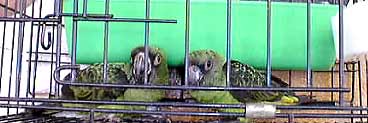Environmental law enforcement and the survival
mentality
The environmental laws on the books in Angola are comprehensive
in their scope and laudable in their vision. But enforcement
of environmental law here, as one informant told me, is "non-existent." Neither
the funding nor the institutional capacity exists for creating
the enforcement networks to protect the Angolan environment.
One afternoon, as I followed an unfamiliar curve in the dusty
streets of Luanda, I noticed a row of wire cages. At first
I assumed that these were merely chicken coops, but upon closer
examination, I realized the cages were crowded with finches,
doves and parrots. A flash of emerald revealed a pair of Jardine
parrots huddled at the bottom of their cage. Below was a troop
of African Grey parrots of the Congo variety. The "veterinario"
with a face too young for his title told me that os verdes were
from further up the coast of West Africa and os
cinzas had been trucked in from the Angolan
interior.
 |

These particular African Grays
are of the 'Congo' variety and are renowned
for their intelligence.
|
Torn from their complex social structures and denied the quintessential
element of birdness – flight – the squawks and
shivers of these parrots made me shudder. My personal biases
are simple: life in a cage cannot compare to a bird's life
in the wild. Professionally, I've seen the dreadful, cruel
conditions of the animal trade through previous work for an
organization involved in international wildlife law enforcement
and I would encourage anyone to rethink buying a pet that may
have been captured from the wild. Furthermore, these animals
fulfill a special niche within their ecosystems
and we cannot predict the impact of their absence. (To learn
more about the bird trade, visit The
Gabriel Foundation.)
The trade in wildlife, along with many transgressions of environmental
law, often is the result of a survival mentality and a lack
of alternatives. After 27 years of war,
the survival mentality is pervasive in Angola. People are concerned
with putting food on the table today. Those searching for safety
don't think in terms of when tomorrow comes, but if tomorrow
comes. After all, the average life expectancy at birth in 2000
was 44.6 and almost one third of Angolan children don't see
their fifth birthday.
The lack of alternatives often impedes environmentally sound
practices. Someone I interviewed who is familiar with businesses
in Luanda explained that local companies' policies for waste
disposal
are often limited to pouring toxics down the drain or in the
street. Proper disposal networks are lacking. Assuredly, these
chemicals flow into Luanda's bay to mix with the
beer cans, used condoms, raw sewage and orange peels floating
there.
Chances
are,
the fishermen trolling the bay and the women balancing plastic
buckets of crispy, silver-streaked fish have accumulated doses
of toxics originating from these drains.
'Law enforcement'
Oil companies are not challenged by survival in the sense
that people are. Their willingness to comply with environmental
law may be based upon considerations such as cost-benefit rationalizations
or public opinion.
A number of questions arise with regard to enforcement of
environmental law related to oil production in Angola:
1) Who is formulating the laws? In the case of Angola, oil
companies have played a large role in advising the government
Ministry of Petroleum and the Ministry of Environment in the
formulation of regulations. On the positive side, the companies
know exactly what practices could cause environmental harm.
However, does their input bias legislative formulation?
2) What are the costs of environmental compliance? In the
case of spills, environmental harm may be obvious and call
for immediate action. But, in the case of a barely noticeable
leak in a pipeline that is costly to replace, action could
be postponed even though it may cause greater environmental
damage.
3) Do the government institutions have the will to enforce
the law? How is monitoring conducted? Are the officers prone
to enticements or are they professional? Are the gains from
environmental law enforcement recognized?
4) What is the relationship between the enforcing institution
and the local community? How do local people play a role in
protecting and managing their natural resources? Do they feel
threatened or ignored by the enforcing institution? Are there
mechanisms for reporting transgressions?
Ultimately, the efficacy of Angola's environmental law will
be determined not only by the voluntary compliance of individuals
and corporations,
but by the strength of law enforcement activities and the input
of communities relying on natural resources for survival, both
today and long into the future.
— Kristin




